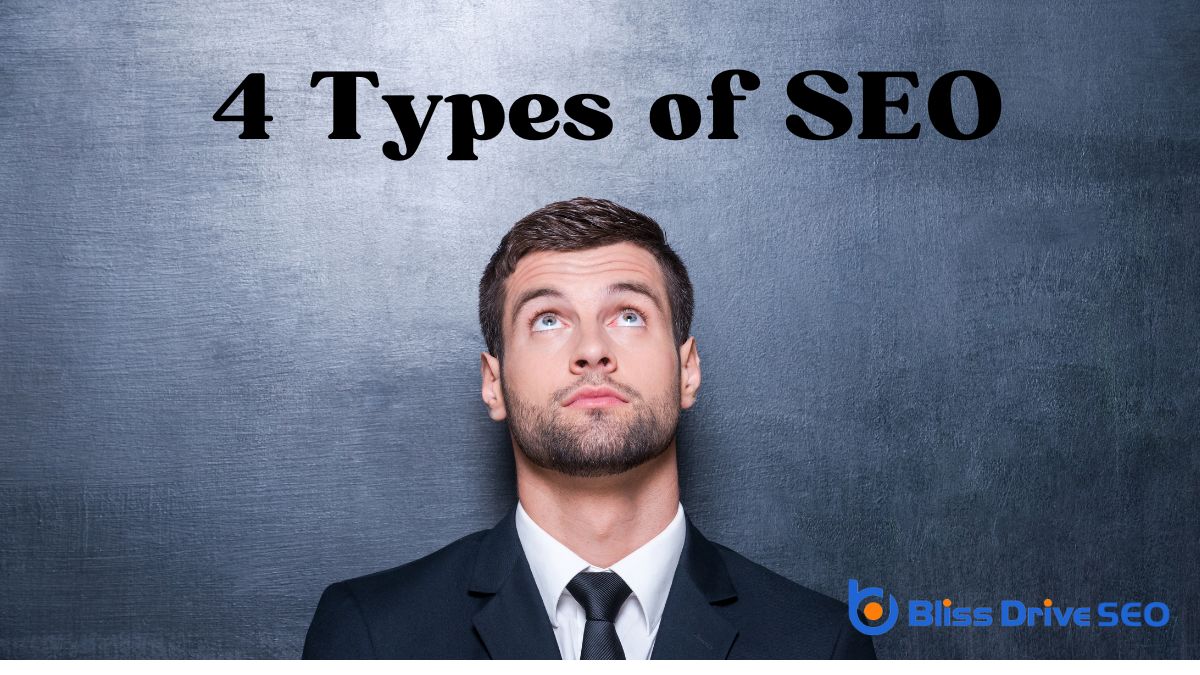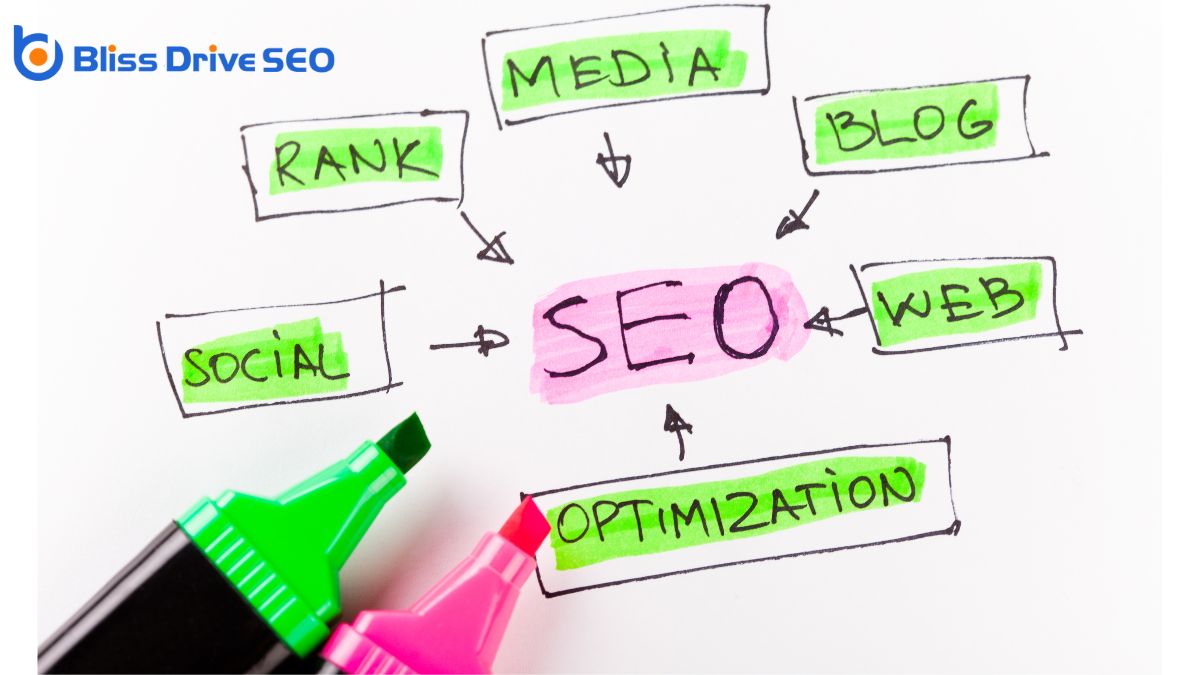Digital Marketing Services
Learn More About Us

You're venturing into SEO, a critical aspect of digital marketing that boosts your online presence. Focus on the four main types: On-Page SEOOptimization techniques performed directly on the website, including content and HTML source code., where you enhance individual pages using quality content and strategic keywordsWords or phrases that users type into search engines to find information.; Off-Page SEOOptimization actions taken outside the website, primarily involving backlinks and social media., which builds authority through backlinksLinks from other websites pointing to your website, crucial for SEO. and social media; Technical SEOOptimizing the server and website structure to improve search engine crawling and indexing., ensuring your site is easily accessible to search engines and users; and Local SEOOptimization strategies aimed at improving a website’s visibility in local search results., improving your business's visibility in local searches via Google My Business and local keywords. Each type plays a unique role in optimizing your website's performance. Discover how these elements work together for maximum impact.

On-page SEO is one of the most essential elements you need to master for effective website optimization. It focuses on optimizing individual web pages to rank higher in search engine results and drive more relevant traffic.
You'll want to start by paying attention to your content's quality and relevance. Search engines prioritize content that answers users' queries effectively, so it's critical to create valuable, informative, and engaging content.
Keywords are another vital aspect. By strategically placing relevant keywords in your titles, headings, and throughout your text, you help search engines understand what your page is about. However, avoid keyword stuffingOverloading a page with keywords to manipulate search engine rankings.; it can harm your rankings.
Don't overlook meta tagsHTML tags that provide information about a web page to search engines and visitors.—your title tagAn HTML element that specifies the title of a web page, displayed on the SERP and browser tab. and meta descriptionA brief summary of a web page’s content, shown in the SERP. should be concise and compelling, encouraging clicks from search engine results pages. Additionally, using descriptive URLs helps users and search engines grasp your content's context quickly.
Images also play a role in on-page SEO. Use alt tags to describe your images, improving accessibility and providing additional keyword opportunities.
Lastly, make sure your website's speed, mobile-friendliness, and overall user experience are excellent. These factors all contribute to better on-page SEO, helping your site thrive online.
Off-page SEO is vital for building your website's authority and credibility, extending beyond the confines of your own pages. It's about creating a network of trust and recognition around your site.
At its core, off-page SEO involves activities like link building, social media engagementThe interactions that users have with a brand’s content on social media., and influencer marketing. By securing backlinks from reputable sites, you signal to search engines that your content is valuable and trustworthy. Think of these links as votes of confidence for your website.
Engaging with social media platforms also plays an essential role. When you share content and interact with users, you increase your visibility and drive traffic to your site. This, in turn, can leadA potential customer referred by an affiliate who has shown interest in the product or service but h... to more backlinks and higher search engine rankings.
Another effective strategy is collaborating with influencersIndividuals with the power to affect the purchasing decisions of others due to their authority, know.... When they promote your content, they introduce your brand to a broader audience, enhancing your site's reputation.
When addressing Technical SEO, you'll focus on making your site more accessible to search engines and improving user experience.
Enhancing your website's crawlability guarantees that search engines can efficiently understand and index your content.
A well-optimized website is crucial for enhancing crawlability, which is where technical SEO plays a role. When search engines crawl your site, they gather information to determine how it should rank in search results. If your website isn't easily crawlable, you risk being overlooked. You need to make sure that search engines can efficiently navigate and index your content.
Start by creating a neat and logical website structure. Use a clear hierarchy with an organized flow from your homepage to categories, subcategories, and individual pages. Implementing an XML sitemapA file that lists a website’s important pages to ensure search engines can find and crawl them. can be extremely helpful. It acts like a roadmap, guiding search engines through your site and making sure they don't miss any important pages.
Check for broken links and fix them promptly. These links can confuse crawlers and lead them astray.
Additionally, verify that your site's robots.txtA file that tells search engine crawlers which pages or files they can or cannot request from your s... file is correctly configured to avoid unintentionally blocking crawlers from accessing valuable content.
Another aspect to take into account is using canonical tags. These tags prevent duplicate contentContent that appears on more than one web page, which can negatively impact SEO. issues by indicating to search engines which version of a page to prioritize. By concentrating on these technical aspects, you enhance your site's crawlability, ultimately improving your visibility in search results.
Improving your site's crawlability is just one aspect of technical SEO; optimizing site speed is equally significant. When your website loads quickly, it enhances user experience, reduces bounce rates, and can positively impact your search engine rankings. Search engines like Google consider site speed a ranking factor, so a faster site can lead to better visibility in search results.
To optimize your site's speed, start by minimizing HTTP requests. This means reducing the number of elements on your page like images, scripts, and CSS. You can also enable compression to reduce file sizes, which helps pages load faster. Use tools like Gzip to achieve this.
Another essential step is to optimize images by using the right format and compressing them without losing quality.
Leveraging browser caching can also make a significant impact. It stores parts of your website in a user's browser, so they don't have to download them again on their next visit.
To wrap up, consider using a content delivery network (CDN)A system of distributed servers that deliver content to users based on their geographic location. to distribute your site's content across multiple servers worldwide, reducing the distance data travels and speeding up load times for users globally.
When you concentrate on local SEO, you're enhancing your business's visibility in nearby searches, making it simpler for potential customers to find you. This strategy improves your reach, connecting you with more people in your area who are searching for the precise services or products you provide. By optimizing locally, you guarantee your business stands out in a crowded digital landscape.
Local SEO is crucial for businesses aiming to attract nearby customers and enhance their community presence. By focusing on local visibility, you can make sure that your business stands out when potential customers search for products or services in your area.
Start by optimizing your Google My Business profile. Make sure it's complete with accurate information like your address, phone number, and business hours. This makes it easier for locals to find you and can improve your ranking in local search results.
Next, encourage satisfied customers to leave positive reviews online. Reviews don't just build credibility; they also indicate to search engines that your business is trustworthy and relevant.
Don't forget to optimize your website content with local keywords. Use phrases that include your city or neighborhood to help search engines understand where your business is located.
Additionally, consider getting listed in online local directories. Consistent listings across various platforms can enhance your local search visibility.
Engaging with the community through local events or partnerships can also strengthen your local presence. Remember, boosting local visibility isn't just about online tactics; it's about being a recognized and valued part of your community.
Expanding your business's reach in the digital age often hinges on effective local SEO strategies. Local SEO is important because it directly targets customers in your area, making it easier for them to find your business. When someone searches for a product or service you offerThe specific product or service being promoted by affiliates., local SEO ensures your business appears in those search results. This can greatly boost foot traffic to your physical location and increase online inquiries.
To enhance your business reach, focus on optimizing your Google My Business profile. Make sure your business details are accurate, including your address, phone number, and operating hours. Encourage happy customers to leave positive reviews, as they influence potential clients and improve your search ranking.
Also, use local keywords in your website content, blog posts, and social media updates. This helps search engines understand your relevance to local searches.
Don't overlook the power of local backlinks. Collaborate with local businesses, join community events, or contribute to local blogs to gain valuable links. These efforts strengthen your local online presence.
Although each type of SEO has its unique strengths, integrating them can significantly enhance your digital presence. By combining on-page, off-page, technical, and local SEO strategies, you create a holistic approach that addresses all aspects of search engine optimization. This means guaranteeing your website is optimized for search engines, establishing authority through quality backlinks, maintaining technical elements like site speed and mobile-friendliness, and targeting local search queries.
Start by auditing your current SEO practices. Identify which areas need improvement and where you can blend different strategies.
For example, when optimizing content (on-page SEO), make sure it's technically sound with fast loading times and a responsive designA web design approach that makes web pages render well on a variety of devices and window or screen .... Simultaneously, build a network of relevant backlinks (off-page SEO) that reinforces your content's credibility.
Don't forget to localize your efforts if your business serves specific areas. Use local SEO tactics like Google My Business listings or local keywords to capture nearby audiences.

Embracing an all-inclusive SEO strategy brings numerous advantages to your digital presence. By covering all bases, you guarantee that your website is optimized for search engines from every angle. This holistic approach not only improves visibility but also enhances user experience, leading to more conversions and sustained growth. Understanding the benefits of a thorough strategy can guide your efforts effectively.
Here's how a well-rounded SEO strategy can benefit you:
Incorporating all four types of SEO—on-page, off-page, technical, and local—into your strategy guarantees you're covering all bases for the best search engine visibility. By understanding and applying these elements, you'll boost your site's performance and attract more targeted traffic. Don't just focus on one; integrate them for a thorough approach. It's about creating a seamless experience for users and search engines alike. Embrace this holistic strategy, and you'll see your efforts pay off.
